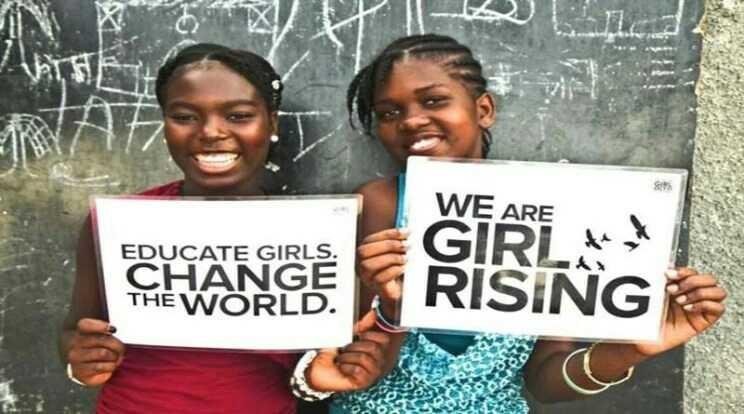
Greetings Everyone. I'm very pained, just got back from my friend's house and she was weeping because her dad said he aint sending her to the University because she's a girl and would get married and become a housewife someday therefore its needless wasting money on her education rather he would send her Younger brother to school because he's the one who'll bring his wife home. I was astonished hearing a matured man think this way about his girl child, hence this post titled "Importance Of Girl Child Education".
The importance of girl child education in Nigeria cannot be overemphasized. Education is a basic right for all people regardless of gender, age, and nationality. Why does Nigerian society still neglect it? The more educated women live in a country, the wealthier it becomes.
The girl-child education in Nigeria doesn’t look so promising for now. Unfortunately, the importance of education among girls is underestimated. This fact causes lots of problems for every family and the country in general.
The importance of girl child education in a nation’s welfare are:
Reduces inequality :
Education is a great “leveler”, illiteracy being one of the strongest predictors of poverty. Primary education plays a catalytic role for those most likely to be poor, including girls, ethnic minorities, orphans, disabled people, and rural families. By enabling larger numbers to share in the growth process, education can be the powerful tide that lifts all boats.Increases productivity and earnings :
Research has established that every year of schooling increases individual wages for both men and women by a worldwide average of about 10 percent. In poor countries, the gains are even greater.Drives economic competitiveness:
An educated and skilled workforce is one of the pillars of the knowledge-based economy. Increasingly, comparative advantages among nations come less from natural resources or cheap labor and more from technical innovations and the competitive use of knowledge. Studies also link education to economic growth: education contributes to improved productivity which in theory should lead to higher income and improved economic performance.Poverty-reducing effects :
Education can vitally contribute to the attainment of the Millennium Development Goals. While two of the goals pertain directly to education, education also helps to reduce poverty, promote gender equality, lower child mortality rates, protect against HIV/AIDS, reduce
fertility rates, and enhance environmental awareness.
Improves health and nutrition:
Education greatly benefits personal health. Particularly powerful for girls, it profoundly affects reproductive health, and also improves child mortality and welfare through better nutrition and higher immunization rates. Education may be the single most effective preventive weapon against HIV/AIDS.Contributes to democratization :
Countries with smaller education gap between rates of boys’ and girls’ schooling tend to enjoy greater democracy. Democratic political institutions (such as power-sharing and clean elections) are more likely to exist in countries with higher literacy rates and education levels.Reduces women’s fertility rates :
Women with formal education are much more likely to use reliable family planning methods, delay marriage and childbearing, and have fewer and healthier babies than women with no formal education. It is estimated that one year of female schooling reduces fertility by 10 percent. The effect is particularly pronounced for secondary schooling.Lowers infant and child mortality rates :
Women with some formal education are more likely to seek medical care, ensure their children are immunized, be better informed about their children's nutritional requirements, and adopt improved sanitation practices. As a result, their infants and children have higher survival rates and tend to be healthier and better nourished.Lowers maternal mortality rates :
Women with formal education tend to have better knowledge about health care practices, are less likely to become pregnant at a very young age, tend to have fewer, better-spaced pregnancies, and seek pre- and post-natal care. It is estimated that an additional year
of schooling for 1,000 women helps prevent two maternal deaths.Protects against HIV/AIDS infection:
Girls’ education ranks among the most powerful tools for reducing girls’ vulnerability. It slows and reduces the spread of HIV/AIDS by contributing to female economic independence, delayed marriage, family planning, and work outside the home as well as greater information about the disease and how to prevent it."Increases women’s labor force participation rates and earnings*:
Education has been proven to increase income for wage earners and increase productivity for employers, yielding benefits for the community and society.Creates intergenerational education benefits:
Mothers’ education is a significant variable affecting children’s education attainment and opportunities. A mother with a few years of formal education is considerably more likely to send her children to school. In many countries each additional year of formal education completed by a mother translates into her children remaining in school for an additional one-third to one-half year.
I understand that arguments abound that the more educated women get, the more broken homes a society has to address and hence the more children with a distorted world view we have to encounter. Now even though recent trends may prove that assumption to be right I will counter that by stating that we already have enough divorce and plenty of distorted individuals around. Maybe a try at compulsory girl child education will address many other more critical issues like child and maternal mortality amidst others.
The Nigerian constitution clearly stipulates that every child, boy or girl, has the right to education. Actually, the constitution even requires a free and compulsory education for children between the ages of 6 through 15 years. Nonetheless, we are aware that there are over 10 million children that are not in school and are not receiving any form of training to help them better their lots in life. Of these 10 million children, the woman – or more accurately, the girl child- constitutes a sizeable chunk. I wish some parents will see the equality between an boy and girl child.
REFERENCES.
- Nigerian Finder.
- NAIJ.COM media limited 2011-2018.
*http://iphieamaka.blogspot.com/2011/03/importance-of-girl-child-education-to.html?m=1
Hi! I am a robot. I just upvoted you! I found similar content that readers might be interested in:
http://siteresources.worldbank.org/EDUCATION/Resources/278200-1099079877269/547664-1099080118171/EducationBrochure.pdf